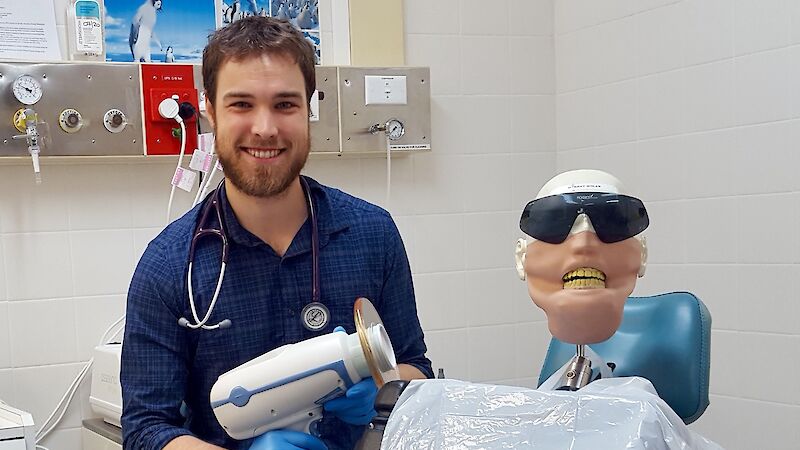It's hard to imagine a more remote doctor's surgery location than the Macquarie Island research station, 1,500 kilometres south-east of Hobart and surrounded by the Southern Ocean.
Like Australia's Antarctic stations, the sub-Antarctic station operates on a single doctor model, supported by a small group of Lay Surgical Assistant-trained expeditioners in case of an emergency.
Come February, the new 2021 season doctor on station will be Dr Rob Dickson.

2020 Rural Registrar of the Year
Dr Dickson is also the recent recipient of the Rural Doctors Association of Tasmania's Rural Registrar of the Year award.
"I'm looking forward to being part of a small, purposeful and cohesive community," Dr Dickson said.
"The simple pace of station life is an opportunity to escape from the complicated gears of modern society. Additionally, an entire year in a Tasmanian national park at the mercy of the elements is certainly my idea of a good time."
Dr Dickson has already had good practice working in remote environments - he recently finished his Fellowship at the Australian College of Rural and Remote Medicine (ACRRM) with an Advanced Skills qualification in Emergency Medicine at Tasmania's West Coast District Hospital in Queenstown.
He says it has prepared him well for sub-Antarctic life.
"Queenstown can be a challenging working environment, but I feel there's so much value and fuel for your inner fires of resilience in embracing these challenges," he said.
"It can be very isolating, the work and logistical dilemmas are taxing and I'm a long way from personal supports. Despite this I found Queenstown offered me a profound medical, community and life experience."
"To me, there are clear parallels to Antarctic work - expeditioners choose a challenging course for themselves, but if we can acknowledge and see past the difficulties there are important experiences to be had."
Remote medicine a "profoundly positive experience"
Dr Dickson's first awareness of Antarctica was garnered during his childhood, growing up in the Canberra suburb and landmarks of Mawson.
Since then he has lived and worked in Sydney, Orange and Alice Springs, en route to a stint at Casey research station and on to rural Tasmania.
Despite the challenges, including "the silent burden of limitless hypothetical medical dilemmas which could unfold at any time of day," Dr Dickson said remote medical work was always an "exciting and dynamic arena to work in," and he'd had a "profoundly positive experience" along the way.
"The award is very encouraging and I'm grateful to have received it," he said.
"Luckily the Polar Medicine Unit has been a pioneer in remote medical work for many decades and the lessons learnt in Antarctica have direct relevance to healthcare delivery all over Australia, the world and space."
"I feel very comfortable practicing medicine in Antarctica - the most remote context on earth - because of the systems and protocols developed by Australia's Antarctic Program."
The time working in Queenstown had also prepared Dr Dickson for another element of Macquarie Island life.
"Queenstown gets more rain so I suppose there's that too," he said.
"I'm primed for inclement weather."
Dr Dickson will depart for Macquarie Island with the rest of the 2021 team next month.






